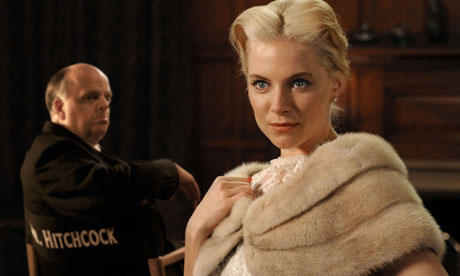
"Blondes make the best victims," Alfred Hitchcock once said. The Girl (BBC2) was Tippi Hedren, the blonde who ultimately refused to be his victim and, as this HBO film was largely based on Hedren's own interviews and Donald Spoto's Hitchcock biography, it is reasonable to assume it's a fairly accurate account.
Directed by Julian Jarrold and written by Gwyneth Hughes, it began with Hitchcock choosing Hedren, an unknown New York model, to star in two of his finest films, The Birds and Marnie. It ended with her frozen out of Hollywood for five years after a stand-off in which she refused to work for him and he refused to release her from her contract. As a study of Hitchcock's peculiar and demanding directorial methods, together with some eye-catching early 60s Hollywood period detail, The Girl was a class act: as a study in sexual obsession it was peerless.
Imelda Staunton was a masterfully understated Alma, Hitchcock's wife, who helped talent-spot his starlets and temporarily walked out on him when his fixation with Hedren threatened to get out of hand, while Sienna Miller, as the ambitious, ambivalent, no-pushover Tippi, gave her best performance since playing Edie Sedgwick in the otherwise poor film Factory Girl. But the unquestionable star of the show was Toby Jones's portrayal of Hitchcock.
I'm not really qualified to say how accurately Jones captured the great director's voice and mannerisms, though the curl of the lower lip and the awkward walk felt spot-on. But he laid bare a man who sometimes had trouble distinguishing between the animate and the inanimate; a man touched by genius whose films frequently revealed disturbing psychological truths, but who was often blind to his own motivation; a man who remained essentially unknowable the more you got to know him.
Jones's artistry lay in never quite exposing Hitchcock's soul. If he really despised all actors, how was it that he drew from so many their finest performances? Did he have a sense of transgression or was he stuck in British, schoolboy innuendo? Did his ruthlessness in putting his actors through the wringer stem from a desire for perfection or an unacknowledged sadism? Jones left these questions open. As was the ending in which he railed against his sexual rejection, protesting that he had given Hedren success and acclaim, so the least she could do was sleep with him. This from an overweight, self-acknowledged ugly man in his 60s who had only ever had sex with Alma. Not even Hitchcock can have squared that circle, though he would have been forced to give a grudging thumbs-up to the film.
Less demanding and nuanced was Doors Open (ITV1), a feature-length adaptation of Ian Rankin's 2008 crime novel. If the dramatisation was in any way faithful to the original then, it's nothing like his Inspector Rebus series – and that, as far as I am concerned, is not a plus point. Rebus had edge and noir, while Doors Open, though set in familiar Edinburgh locations, was flimsy. Which is probably why it was commissioned for Boxing Day: it was a feelgood show guaranteed not to frighten the horses, which anyone could follow even if they dozed off for 20 minutes halfway through.
There was nothing much wrong with this lighthearted art-heist-goes-wrong romp. It came and went in an unmemorable two hours, with two-dimensional goodies and cardboard baddies. My principal difficulty, though, was the casting of Stephen Fry as the meant-to-be endearingly eccentric art professor and museum curator. Earlier in his career, Fry was an actor of some stature but these days he tends to play easily recognisable versions of himself. Whether this is because he has become a bit lazy or screenwriters have started writing with him rather than the character in mind, I can't say. I suspect a bit of both. Either the way, tThe show's credibility was undermined from the start by the fact that I didn't believe the professor was anyone other than Fry. He even had an iPhone.
Still, it was all completely harmless stuff and Mike, Laura and Fry all got the happy endings we always knew they would. I just wish the same could have been said of poor old Alan. His fate was unexplained and it rather looked as though he'd just been forgotten about. Maybe even the writers had nodded off by then.

